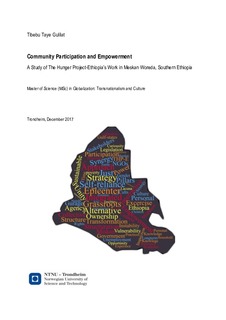| dc.description.abstract | In Ethiopia, despite the increasing number of NGOs and their rising contribution to the national development, literature doesn’t show what development strategies are being employed by these NGOs. This study examines the Hunger Project Ethiopia’s (THP-E’s) development approach, i.e., called the epicenter development strategy, and the extent to which it has succeeded in participate and empower the people for self-reliant participatory development. The study takes Meskan epicenter, located in Southern Ethiopia, as a principal case.
Based on the ontology of alternative development approach, as a bottom-up process, this study is guided by interpretivism and employed qualitative methodology to gather relevant data. Accordingly, the study discusses participation and empowerment as the underlining process of THP-E’s work. It is described as extensive and is described in four phases. In its theory of social change, THP-E perceives the people as inherently extraordinary, if assisted through strategically designed empowerment programmes, and they are capable of being self-reliant. Its conception self-reliance and
Findings indicate that THP-E could mobilize the people for their own development and is reflected from their participation by: being members to the epicenter, participating in the epicenter’s leadership ladder, and contributing their local resources for the success of the epicenter’s programmes. But, findings also shows that both personal and structural factors hamper the full participation of the people in the overall epicenter activities. Some external challenges and the limitations also continue to undermine its works. For instance, despite its effort to transform the status of women among the Meskan people, THP-E was unable to challenge the extremely sex-centered ritual cults among the Meskan people that have left women to be treated as second-class citizens. Moreover, even though Meskan epicenter is to be graduated as a self-reliant community by the beginning of 2018, absence of opportunity structures has mounted their needs for external support, especially of the local government, which has continued to be decisive in determining their future fate.
The study concludes that continued empowerment work, with much focus on creating enabling external conditions, is needed to further unlock the agencies of the people for self-reliant development. | nb_NO |
